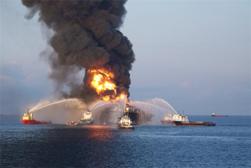
Ted Nield remembers the 11 workers who died on Deepwater Horizon and wonders where the sympathy for our industrial heroes has gone.
Geoscientist July 2010
Talk about heroes of industry all sounds a bit Soviet these days. Yet, perhaps because I was born in Wales and count among my ancestors men who went down collieries at the age of 11, I preserve strong admiration for all those who find and win the Earth materials upon which we all depend, and whose supply we now take so much for granted.
Miners, until they became an inconvenience in the 1970s, commanded enormous public admiration. Their work was ghastly, tough and dangerous, and until fairly late in the game, badly paid. Moreover when everyone had to dig their own coal from the bunker on cold nights and hump it indoors, people maintained a physical connection with their source of heat – instilling a visceral understanding that doesn’t come from turning on a switch.
When mining disasters struck as they too often did, everything stayed out of sight. Miners at least knew their place and had the decency to die privately, alone, and in darkness, without offending our view. Yet even after 21 October 1966, when millions of tonnes of colliery spoil overwhelmed Pantglas Junior School in Aberfan, killing 116 children - among which dreadful toll, but for a fluke of history my own name would have figured - the national reaction never expressed itself in terms of hatred for the evil coal industry.
Forty-four years on, with coal little more than a folk memory, things are different. Oil and gas have taken its place, and so superior are they both as a fuel and raw material, that our dependency upon them is almost completely overlooked. This makes it even easier for us to forget the genius, drive, creativity and, yes, heroism of those who make it possible. Worse still, when things do go wrong in oil, everyone gets to share the suffering.
On 20 April this year every oil worker’s nightmare came true at Deepwater Horizon, in the Gulf of Mexico, when everything that could have gone wrong did – seemingly at the same time. Eleven oil workers died, 50 miles off the Louisiana Coast; yet there was no outpouring of grief for them - beyond a small, private memorial service in Jackson, Mississippi.
The reason seems clear, and manifestly unjust. Unlike miners, oil workers are perceived to earn too much money, in a profession that is (thankfully) nothing like as dangerous as mining once was. Moreover, oil’s disasters not only inconvenience others, but threaten the environment - to the extent that State Governors and Presidents line up to take shots at the very industry that not only feeds them and clothes them as human beings, but as politicians pays for them through its taxes. I this futile blame game, the real culprit – our society’s addiction to hydrocarbons and refusal to wean itself from the habit – is allowed to go unaddressed. Nobody acknowledges that the fact we enjoy the luxury of caring so much about the environment – apparently more than we care about human life - almost solely because Big Oil, and the heroes who work in it, have made our lives so comfortable and convenient. Politicians take note – this is not Avatar. This is real.